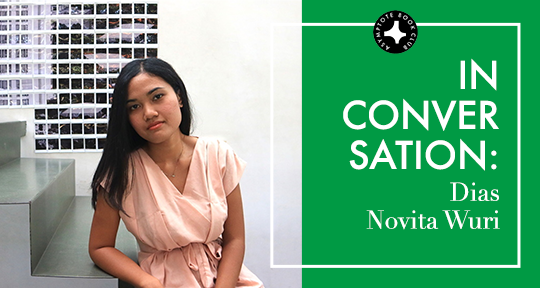In Birth Canal, Dias Novita Wuri masterfully braids disparate storylines of women across various countries and time periods to track the shifting contexts of sexuality, femininity, family, and gender roles. What results is an alternative face of history, from the violence of wartime and colonialism to the contemporary dynamics of sex work and objectification. As our September Book Club selection, this subversive and unflinching text defies generalisation and presumption to consider the many ways a body can be used—and freed. In this interview, Novita Wuri speaks on how the women in her life inspired the novel, sexuality and politics in Indonesia, and the mental anguish that surrounded the writing and reading of this powerful text.
The Asymptote Book Club aspires to bring the best in translated fiction every month to readers around the world. You can sign up to receive next month’s selection on our website for as little as USD20 per book; once you’re a member, join our Facebook group for exclusive book club discussions and receive invitations to our members-only Zoom interviews with the author or the translator of each title.
Thuy Dinh (TD): Could you explain the meaning behind the title Birth Canal?
Dias Novita Wuri (DNW): Birth Canal actually doesn’t have as much significance in English as it does in Indonesian—which you wrote about very well in your review. The term in Indonesian is jalan lahir; jalan means a road, or a way—something one has to go through, and lahir here means birth. You can see it doesn’t really translate very well to English, and my editor and I decided to go with “birth canal”. I wanted a short, impactful title because my first book’s title, Makramé, was very simple. Of course, the birth canal is part of the reproductive system, and I wanted to use a bodily word to symbolise the feminine struggle related to procreation. It’s hard not to talk about birth because it’s a woman’s “duty” to give birth, and I think this term nicely represents the stories of all the women in my story.
TD: Your book doesn’t seem to think there is a necessary connection between fertility and motherhood—as some characters in the book can’t have children but yearn to be mothers. Can you expound on this theme?
DNW: I wanted to talk about a lot of the women that I know in my life, some of which can’t have children, or struggle to have children but want to have children, and others who don’t want children at all. For me, it was important to talk about everyone’s story and experience with the term “motherhood”. I also knew people who got pregnant as teenagers outside of marriage, and that’s why I opened the book by talking about abortion, because abortion is illegal here in Indonesia. It’s very frowned upon—which doesn’t mean it doesn’t happen.
Actually, when I open up to the women that I talk to in Indonesia—my friends and acquaintances—sometimes they would tell me that they have had abortions. It’s a shame that it’s illegal and not talked about, because it’s something that women need. It’s a basic healthcare right. To have such shame and stigma surrounding abortion can only be detrimental to women’s lives in Indonesia. Some of them might be mothers already, but they can’t handle another child or can’t afford another child. Yet, they can’t have an abortion. READ MORE…

